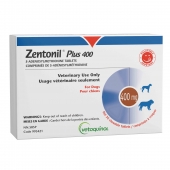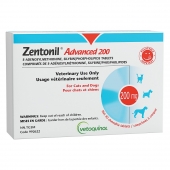Despite their tiny (or even microscopic) size, parasites represent a very big threat to your pet’s health and your own. Because better understanding plays an important role in parasite prevention, here’s what you should know about these unwelcome guests.
1. There are over 70 parasite species dangerous to pets in North America.
In Canada, parasites are grouped into five main categories: fleas, ticks, mites, heartworms and internal parasites. Your pet can become infected through a few different ways. For example, fleas can jump up to 19 inches to latch onto your cat as they’re exploring the outdoors. A mosquito biting your dog could allow a heartworm to make a new home inside their body.
To find out which species are most common in your province, visit parasiteprotection.ca.
2. Parasites can have serious consequences on your pet’s health.
Parasite infections can cause a broad range of symptoms, from mild discomfort to fatal health issues. Mites and fleas provoke intense itching, and if your pet scratches excessively, they may develop skin infections. Intestinal worms upset the digestive system and may cause vomiting, diarrhea and weight loss. Finally, an untreated heartworm can lodge itself deep into a pet’s heart, eventually leading to congestive heart failure and death.
3. Some parasites can be dangerous to humans as well.
Mites and fleas may cause irritation to humans as well as their pets, and can cause severe rashes and itching. Luckily, humans cannot be hosts to fleas and generally only develop some itch spots where they were bitten. Certain ticks are infamously dangerous to humans, as their bite may transmit Lyme disease. While the majority of dogs who test positive for Lyme disease remain asymptomatic, it can have long-lasting consequences on humans such as persistent fatigue, pain, aching joints or muscles and even trouble concentrating, decreased short-term memory and speech problems.
For these reasons, while parasite prevention is always important, it becomes even more so if your household includes children or family members with a weakened immune system.
4. Parasite prevention is important year-round.
No matter how cold Canadian winters can be, a lot of parasite species have learned to adapt and endure it. Ticks enter a dormant state for most of the cold season, but can go hunting for food as soon as the temperature rises above 4°C for a few hours, which often happens in the early or late weeks of winter.
5. It’s easier (and cheaper) to prevent parasites than it is to get rid of them.
Giving your pet their monthly parasite prevention product is a predictable routine you can budget for and work into your schedule. But once an infection requires treatment, medication may become more expensive.
Also consider the impact a parasite infection can have on your home. Fleas can lodge themselves into sofas and cracks between floorboards, and a single female can lay up to 50 eggs in day. After just two days, the eggs are ready to hatch. Once a house is infected, it may take weeks of vacuuming and chemical treatments or expensive visits from a professional exterminator to rid it entirely.






